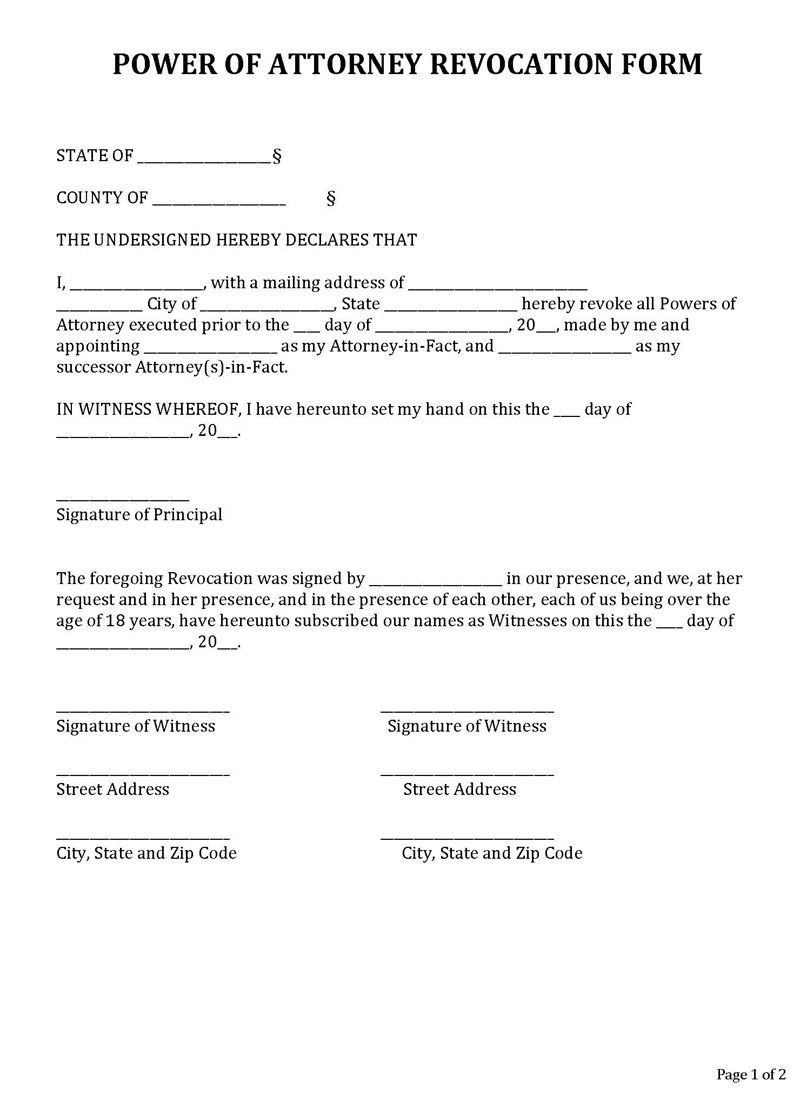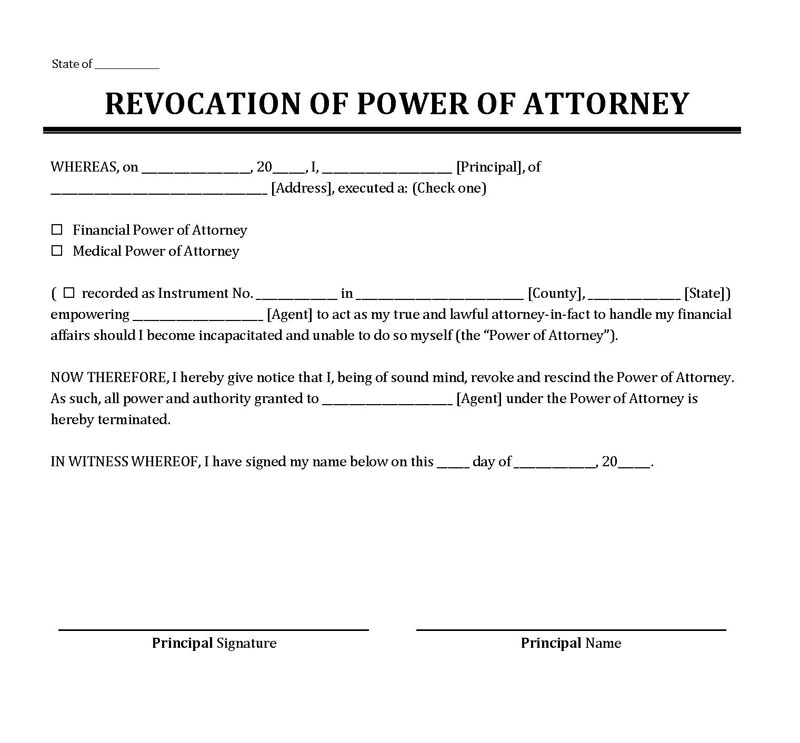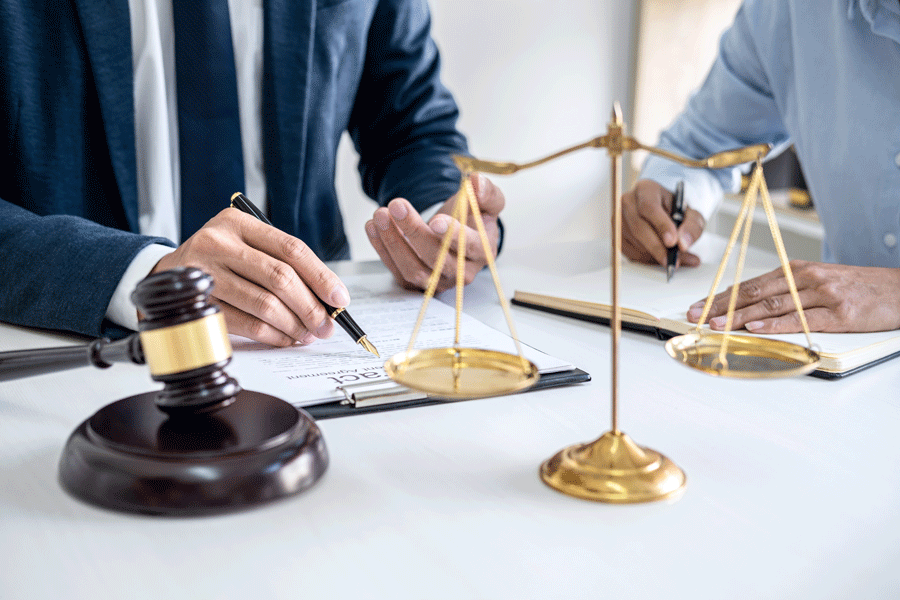To revoke an already executed power of attorney, the principal will need to draft a revocation of power of attorney form, duly sign the document and date it appropriately. Copies of the completed and the signed document should also be issued to the agent or attorney-in-fact and institutions or entities using the holder’s power of attorney. A principal may also revoke their POA by destroying every copy of any existing POA documents and preparing and executing a new document of it, that will automatically supersede the original one. However, this method of cancelling is not usually recommended as it may bring about complications down the line. The cancellation or voiding of a POA is known as the revocation of power of attorney.
A Power of Attorney, which is commonly abbreviated as a POA, is a document that gives someone else (the agent) significant control over the holder’s (principal) financial affairs, medical care, and business decisions.
The powers granted by a POA may be very broad or limited in scope depending on the type of powers that the principal chooses to grant their agent. It may also be limited to a specific period, spring upon the occurrence of a specified event, or it may remain valid indefinitely.
Free Revocation POA Forms


Who Can Revoke a Power of Attorney?
A principal holder may revoke a power of attorney if they no longer need their agent to act on their behalf. The revocation process will vary depending on the type of POA initially executed. At the time of voiding the document, the principal must be mentally capable of making decisions.
Similarly, the principal should not be incapacitated in any way. Given that the holder is under physical restraint or cannot communicate effectively, someone appointed by the court to act on the principal holder’s behalf can revoke their power of attorney. An agent or attorney-in-fact may also terminate a power of attorney under certain circumstances.
Reasons to Revoke a POA
Specific reasons may necessitate revoking a power of attorney. However, the most typical reasons for voiding the document are:
- When there has been mismanagement or abuse of the powers, the POA form grants.
EXAMPLE
If there was the undue influence exerted on the holder by someone other than the requester or if the principal is incapacitated somehow.
- When the agent has violated the terms of a power of attorney by using or attempting to use undue influence to force the principal to give away assets, move into an institution for their safety, attend financial counseling sessions, etc.
- When the agent has been convicted of a non-financial crime, particularly one against the principal.
- In situations where the agent is no longer interested in holding a power of attorney.
- When the principal has regained their mental capacity and wants to take back control of their affairs.
- When the agent can no longer handle the principal’s affairs due to availability issues, such as when they frequently travel overseas.
- If the relationship between the principal and the agent changes and the holder no longer trusts that the agent will act in their best interests.
EXAMPLE
In cases where the agent is the principal’s spouse and they have divorced.
- If the principal becomes incapacitated and their POA is non-durable, it terminates by default. Similarly, if the principal holder dies, their POA is automatically cancelled.
- The death/incapacity of an appointed agent may also necessitate revoking an existing power of attorney
- Finally, suppose a principal wants to alter the terms of an existing power of attorney. They may be forced to revoke the existing POA and create a new document that will automatically supersede the old one.
How to Revoke a Power of Attorney
Revoking a power of attorney does not have to be complicated as long as the instructions for the revocation form are followed meticulously. However, before revoking a POA, it is essential to gather all the pertinent information such that it is easier to proceed with the revocation process.
Once all the documents and the necessary information is readily available, the following steps should be taken to ensure the revocation of power of attorney is valid:
Step 1: Prepare a document
First, a revocation form must be prepared. There are various templates of these forms available online, and a holder may choose to fill them out independently. However, a principal may also choose to hire the services of a competent attorney who will fill the document on their behalf, mainly if they are unsure of how to fill it out and wish to avoid any legal issues that may arise from voiding their power of attorney.
While filling out the revocation form, it is crucial to ensure that the dates, names, and addresses of the agent and principal and specific third-party information are mentioned correctly. Besides, the state and country in which the POA is in effect should also be filled correctly.
Step 2: Signing, notarizing and witnessing the document
The principal holder should sign it after filling out the revocation of power of attorney form appropriately. The signing of the form should be done before a notary public, and at least two disinterested witnesses should be present to witness its signing to prove that the document is legitimate.
The notary official must also sign the form, enter the county and state where the revocation form is being signed, and place their official seal in the document.
Step 3: Record the document
Once this revocation form duly signed and notarized, it should be filed and recorded with the appropriate authority or court registry to ensure a record of the revocation action.
Step 4: Notify others
After the revoked power of attorney is recorded in the relevant court registry, copies of the original form should be made and issued to the holder’s agent and all relevant institutions, organizations, and entities previously informed of it.
Copies of the revocation form should be hand-delivered to the concerned parties, and if this is not possible, they should be sent via certified mail to ensure that there is proof of receipt. This step is essential because it ensures that all the concerned parties know that this form has been filed and recorded; thus, they will act accordingly.
How to Write a Revocation of POA Form
The process of revoking a power of attorney is compassionate and should be handled with care to avoid any unnecessary legal issues in the future. Therefore, before filing the revocation form with the appropriate court registry, the instructions for filling out the form must be carefully followed. In addition, all the relevant details must be written correctly.
The essential details to incorporate in the revocation of power of attorney form include:
- The county and state name: In this section, the person revoking a power of attorney should state the name of the county where the document will be signed and the state that has jurisdiction over it.
- Principal’s name, mailing address, and the original date: The principal’s full name and mailing address should also be explicitly written in the form of revocation of power of attorney. The date that the original power of attorney was signed and executed should also be provided in the form for easy referencing.
- The name and address of the agent: The person completing the revocation form should fill in the appropriate information regarding the attorney-in-fact’s name, address, and relevant identification number. The date the initial power of attorney was written and filed should also be supplied in this section. Additionally, a separate section for filling in the name and mailing addresses of a third party or institutions using the POA should also be created, and their detailed information entered correctly.
- Witnesses’ name and mailing address: The principal’s name will be mentioned again in this section, alongside the effective revocation date. In addition, there will be a designation for writing the witnesses’ names, mailing addresses, and a section for providing their valid signatures.
- Notary public: This section should be filled out in detail and include the notary’s full name, address, county, and state where they are authorized to vouch for the signatures of the principal, agent, and witnesses. The notary public should also sign, date, and seal the revocation form to make it legally binding and enforceable.
Making the Revocation of Power of Attorney Valid
Revocation of power of attorney form must expressly state that a power of attorney has been rescinded. It should include all the necessary information about the holder, agent, and third parties’ identities and mailing addresses. In addition, the date the POA became effective, and the date it is revoked must also be stated in the form.
To make the revocation valid, the principal must sign the form in front of two witnesses, and it should be notarized. The document must then be filed and recorded in the county where it was signed to ensure a record of the revocation. Besides, copies of this form should be made available to all relevant persons and entities, including banks, government institutions, or agencies that may have been notified previously about a power of attorney.
The principal’s agent should also be issued copies of the form in person or via certified mail. This will ensure that each concerned party can perform their duties appropriately without any legal issues arising from revoking a power of attorney.
Consequences of Not Revoking a Power of Attorney
Suppose a person does not file a proper revocation of power of attorney form with the appropriate court registry. In that case, the holder of the former POA will be able to legally perform all personal business or financial affairs without any interference from the principal. However, this can lead to serious legal issues and problems.
Below are some consequences of not revoking a power of attorney if it no longer serves the purpose:
Lost opportunity cost
Suppose a person does not officially revoke their power of attorney. In that case, they will forfeit the opportunity to appoint a new agent or give access to any other individual who can legally perform their duties. This will affect that person’s right to grant access to another individual and cause them to lose any other potential business deals.
Mental anguish
Mental anguish may result from being unable to control a person’s affairs. This is particularly true when a principal is undergoing a difficult time in their life and cannot manage it due to an existing power of attorney issue.
Expensive lawyer fees
Suppose a principal holder is forced to seek professional legal advice regarding their power of attorney. In that case, they may have to spend exorbitant amounts of money on attorney’s fees, which could have been avoided if the POA had been revoked effectively.
Irreversible damage
If a principal fails to revoke a POA after its purpose has been fulfilled, permanent damage can occur regarding their personal and financial affairs, which can be costly.
Frequently Asked Questions
No. A principal holder has the right to terminate their power of attorney, and they are not required to explain why they decided to rescind the agent’s powers. However, the principal must notify the agent of this revocation in writing.
No. The principal can revoke an executed POA because they hold the full right to cancel it when they no longer need their agent to act on their behalf. Nevertheless, it is crucial to note that some POAs can be binding, meaning that the principal’s ability to revoke them is limited. For a POA to be deemed irrevocable, it must include a clause stating that it is irrevocable, and the principal can only revoke it according to the law
Yes. If a power of attorney is non-durable, it is automatically revoked upon the principal holder’s incapacitation. However, if it is durable, it will remain active even after the principal is physically or mentally incapacitated.
Nonetheless, suppose a principal is deemed incompetent due to an illness or other reason. They do not have any adult relatives or lawful guardians to act on their behalf. In that case, the court will appoint a competent person to represent them during the revocation process and in subsequent procedures regarding their power of attorney.
There are two main categories of powers of attorney. The general power of attorney and the limited power of attorney. Both types of POAs can be revoked at any time by the principal, or it can be voided due to several reasons such as when the principal dies or is incapacitated, when a court invalidates it or when the agent can no longer carry out the responsibilities as outlined in the holder’s form.
A POA is a legal document. Therefore it must be appropriately revoked by providing all the concerned parties with a written notice. In addition, it must be filed in court to ensure that there is a record of the revocation for future reference.
This way, the principal can be protected from any legal issues arising from cancelling the POA, and the entity requesting access to the principal’s affairs will have a record of the power of attorney revocation; thus, they will not allow the agent to continue acting on the principal’s behalf.
In most cases, when a principal creates a new power of attorney, it overrides the previous one. However, you will want to make sure that your new power of attorney form states that all prior documents are being revoked and notify your previous attorney-in-fact that their powers have been revoked.
In addition, all third parties that may have been using your prior POA must also be issued with a new copy of it. This is crucial because entities, institutions, or persons not knowledgeable of a revocation action cannot be held legally responsible for actions taken based on a prior POA already in their possession.
For the revocation of power of attorney action to be valid, it must be signed, witnessed, notarized, and recorded with the relevant court registry. However, for it to take effect, the principal must notify the previous attorney-in-fact of the revocation such that they can comply with the principal’s directives. If you do not inform your agent of the revocation, their powers may still be legitimate.
The best and most appropriate way to inform your attorney-in-fact of revocation of their powers is through a written notice. The effective date of the revocation should also be provided in the written notice, and it should be hand-delivered to them or sent via certified mail to ensure that there is proof of receipt.
However, suppose delivery in person or by mail is not possible. In that case, you can send the notice via email but consider including a read receipt to verify their receipt of the revocation form.
In certain instances, an agent or attorney-in-fact can revoke their powers in a power of attorney. This is usually when they feel they can no longer act on behalf of the principal holder due to specified issues.
No. An attorney-in-fact is not allowed to revoke another attorney-in-fact powers even if they have the authority to make legal decisions without consulting their co-agent. Only the principal can do so. However, if the principal is incapacitated and has a POA with two agents, the court can invalidate the POA if a revocation is necessary.












